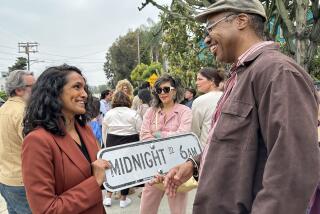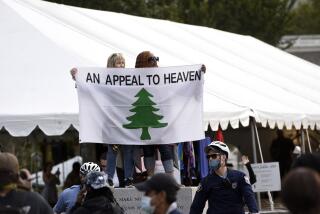Gays Seek Adopt-a-Highway Sign and Get Cold Shoulder
CHICAGO — The practicing pagans of Salt Lake City keep an eye on 2.9 miles of state highway. The Ashland, Ore., Friends of John Denver chapter has a 2-mile stretch of Interstate 5. Nudists in Florida, Wiccans in New Jersey and the Ku Klux Klan of Missouri all have toiled to keep America clean through Adopt-a-Highway programs.
So the Sioux Empire Gay and Lesbian Coalition of Sioux City, S.D., figured they’d sign up for two miles of Highway 38, do their part and get a little state-sanctioned advertising in the process. The state Department of Transportation figured differently, saying the coalition was an “advocacy group” and would therefore not be issued an official roadside sign.
For the record:
12:00 a.m. Aug. 18, 2001 FOR THE RECORD
Los Angeles Times Saturday August 18, 2001 Home Edition Part A Part A Page 2 A2 Desk 1 inches; 35 words Type of Material: Correction
Adopt-a-Highway debate: A story in Wednesday’s paper and an editorial Thursday incorrectly identified the home base of a gay and lesbian group in South Dakota seeking to participate in the Adopt-a-Highway program. The correct city is Sioux Falls.
Advocacy seems a dubious rationale for disqualification: The College Republicans, the Yankton County Democrats and the Animal Rights Advocates of South Dakota already have their names emblazoned along the state’s highways.
Now, nine months after the coalition filled out its application, rancor over the highway sign has grown to the point that Gov. William Janklow has threatened to scrap the entire program statewide, tearing down about 1,000 signs proclaiming the good, trash-hauling deeds of everyone from the South Dakota Wheat Growers Assn. to the Rushmore Lions Club to various Rapid City Boy Scout troops.
Janklow said he would be especially perturbed if the coalition filed suit over such a well-intended program. Late Monday, it did just that, filing a federal complaint alleging equal protection and free speech violations.
“You may call it frivolous if you want to, governor, but, respectfully, let’s call this what it is, 1st Amendment protection,” said coalition President Barbara Himmel-Roberts.
Janklow, a colorful, conservative Republican dubbed by some critics “Wild Bill, the Indian Fighter,” for his frequent head-butting with Native American tribes, was traveling Tuesday and could not be reached. He has said he would announce the program’s fate by week’s end.
The squabble has created deep divisions in the state over whether the group should be allowed to participate, with the American Civil Liberties Union coming down on the side of the coalition and the head of the religious Family Policy Council in Sioux Falls openly worrying that allowing them a roadway sign might lead to, say, same-sex marriages.
No one, however, with the exception, perhaps, of Janklow, seems to think it a wise idea to put the kibosh on a money-saving, good-citizen program over a gay and lesbian group with eight active members and plans for a picnic after each trash day at a roadside stop called Buffalo Ridge. That includes some powerful members of the Ku Klux Klan, a group not known for embracing homosexuality.
“I hate to admit it, because I think being gay and lesbian is an abomination, but they have the same rights we do,” said Ron Edwards, Imperial Wizard of the Imperial Klans of America.
Until the Sioux Empire Gay and Lesbian Coalition took on Gov. Janklow, the KKK was pressing the nastiest Adopt-a-Highway battle in the land.
The Missouri Knights of the Ku Klux Klan had for years been fighting for the privilege of gathering up used diapers, broken bottles and hamburger wrappers on a 1-mile stretch of Interstate 55 south of St. Louis. The state argued it should be barred for several reasons, including the fact that the Adopt-a-Highway program was funded in part with federal dollars and the Civil Rights Act of 1964 bars federal money from going to groups that discriminate.
The state also argued that people might throw trash out just to give the Klan something to do and would probably tear the signs down as well.
After a series of appeals, the KKK’s signs went up last year.
“They’ll win,” Edwards said of the Sioux Falls group. “We did.”
Of course, the KKK’s signs came down the day after they went up, thanks to a vandal with a saw. They went up again. They came down again. . . .
Begun as a simple cleanup campaign in Tyler, Texas, in 1985, the Adopt-a-Highway program now has about 85,400 groups acting as parents to 158,000 miles of roadway, according to the Illinois Department of Transportation.
For a program so downright American its only flaw, it seems, might be its necessity, Adopt-a-Highway has found itself in the middle of numerous odd troubles over the years, and been stretched and refined in a way that’s as American as the premise.
Companies have emerged in California and elsewhere to arrange or even perform the work, for a fee, while you--with that official state sign--take full credit. Under a brand new Pennsylvania program, $350 will buy your adopted highway basic litter removal while $850 will get you “litter pickup, mechanized sweeping graffiti removal and mowing.”
And the public ruckuses, especially involving the Klan, have been numerous. The KKK won a case in Arkansas in 1992, but lost court fights in West Virginia, Ohio, Maryland, Kansas, Alabama and California. It also lost in Texas in 1994, after seeking permission to clean a stretch of road in Vidor that ran past a public housing project where white-hooded members had protested a court-ordered desegregation.
Atheist trash-pickers have caused milder consternation, as have witches and Scientologists, Hells Angels and anti-abortion police officers.(There has been no known outcry against the Friends of John Denver in Ashland.)
In 1990, the North Carolina Department of Transportation turned down several applications to join its program, one from a lingerie shop called the Bra Patch, another from a rock band called the Sex Police. The department didn’t reject outright the Southern Appalachian Lesbian and Gay Alliance, however.
It told the group, in fact, precisely what South Dakota officials told the Sioux Empire Gay and Lesbian Coalition: Adopt the daylights out of your chosen highway, we just can’t provide you with a sign.
The Southern Appalachians filed suit. The state of North Carolina changed its mind, put up their sign, and for good measure, paid the group’s legal fees.
Associated Press contributed to this story.
More to Read
Sign up for Essential California
The most important California stories and recommendations in your inbox every morning.
You may occasionally receive promotional content from the Los Angeles Times.










